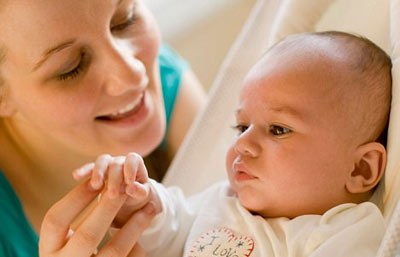|
 Moral code: Even 15-month-old infants know the difference between fair and unfair. |
|
It is often thought of as one of the qualities which distinguishes humans from animals. And a new study has shown that the ability to tell the difference between right and wrong is a skill which even babies can possess. Infants who show a good understanding of what is fair and unfair are also more likely to share their possessions with others. Babies in the study were able to differentiate between the equal and unequal distribution of food, showing an early awareness of fairness, scientists said. There was also seen to be a link between how sensitive the babies were to fair behaviour and whether they would be willing to share a favourite toy. Jessica Sommerville, associate professor of psychology at the University of Washington, said: 'Our findings show that these norms of fairness and altruism are more rapidly acquired than we thought. 'These results also show a connection between fairness and altruism in infants, such that babies who were more sensitive to the fair distribution of food were also more likely to share their preferred toy.' The research, published today in the journal PLoS ONE, involved showing two short videos to 15-month-old babies. In the first, a bowl of crackers was distributed between two people - first with an equal allocation of crackers, and then with one person getting more crackers than the other. The second video showed a jug of milk being shared between two people in a similar way. Scientists measured how long each of the babies looked at how the food had been distributed, as babies pay more attention when they are surprised. They discovered that babies spent more time looking at the allocation of food if one person got more than the other. Dr Sommerville said: 'The infants expected an equal and fair distribution of food and they were surprised to see one person given more crackers or milk than the other.' (Read by Christine Mallari. Christine Mallari is a journalist at the China Daily Website.) (Agencies) |
这经常被视为人和动物相区别的特质之一。 一项新研究显示,即使是婴儿也能够明辨是非。 此外,那些看上去对公平与否有较强理解力的婴儿更可能与他人分享自己的东西。 科学家称,该研究显示,婴儿能够分辨对食物分配是否公平,这表示婴儿很早就有了公平意识。 而且婴儿对公平行为的敏感度似乎还与他们是否愿意分享心爱的玩具存在着联系。 华盛顿大学心理学副教授杰西卡•萨默维尔说:“我们的研究发现,婴儿习得这些公平与无私的行为规范比我们所预想的要快。” “这些研究结果还显示,婴儿的公平意识和利他行为之间存在着某种联系,比如那些对食物分配是否公平更敏感的婴儿也更愿意分享他们心爱的玩具。” 这项研究今日发表在《科学公共图书馆—综合》期刊上,在该研究进行过程中,研究人员给15个月大的婴儿观看了两个短片。 在第一个短片中,一碗饼干被分给两个人——先是把饼干平均地分给两个人,然后是把饼干更多地分给其中一个人。第二个短片中,一罐牛奶按同样的方式分给两个人。 科学家测量了婴儿在观看食物被分配的过程中注意力持续的时间长短,因为婴儿惊讶时关注的时间会更长。 他们发现,如果其中一个人分到的比另一个人更多,婴儿关注食物分配的时间会更长。 萨默维尔博士说:“婴儿认为食物应被公平分配,因此当他们看到其中一个人比另一个人得到更多的饼干或牛奶时,感到很惊讶。” 相关阅读 (中国日报网英语点津 陈丹妮 编辑:冯明惠) |
|
Vocabulary: altruism: 利他主义;利他行为 cracker: (淡或咸的)薄脆饼干;<美>饼干 allocation: 分配,配给 |
